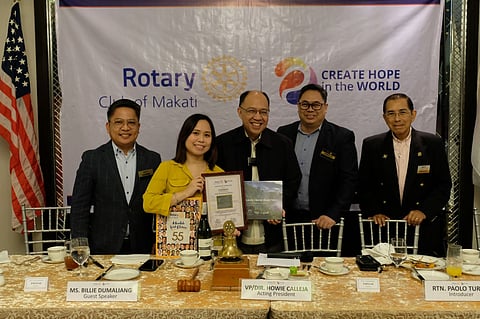
- NEWS
- the EDIT
- COMMENTARY
- BUSINESS
- LIFE
- SHOW
- ACTION
- GLOBAL GOALS
- SNAPS
- DYARYO TIRADA
- MORE

The Masungi Georeserve in the province of Rizal remains among the few forested areas in the country, serving as a watershed and natural tourist attraction.
It has a 10-kilometer mountain range of limestone and around 500 species of plants and animals, several of which are rare and threatened.
Speaking at the weekly Rotary Club of Makati meeting at The Peninsula Manila last 14 May 2024, Masungi Georeserve Foundation’s director for advocacy Billie Dumaliang urged Club members to help maintain the watershed through tourism income while ensuring its protection from uncontrolled commercial activities and human settlements.
“It’s very important for us to speak to the public and tell them what’s happening because this is about the future of 20 million people,” she said.
Masungi Georeserve Foundation, a private-led environmental advocacy group established by Billie Dumaliang and her sister, Ann with funding support from their father’s Blue Star Construction and Development Corporation (BSCDC) has been able to reforest, put up tourist facilities, and operate maintenance activities in the 2,700-hectare watershed using the members’ own money and also, fees from tourists.
Memorandum of agreement
In 2016, the foundation entered into a memorandum of agreement with the Department of Environment and Natural Resources (DENR) under the late DENR secretary Gina Lopez, giving it reforestation rights.
“In 1996, all you could hear was the sound of chainsaws. Today, Masungi has 80 to 90 percent forest cover. Now, you can hear the sounds of birds day and night,” Dumaliang said.
She said several business owners are interested in building huge resorts in the conservation area of the georeserve where the foundation reforested 2,700 hectares of stripped land.
Dumaliang said the Bureau of Corrections (BuCor) had planned to relocate its headquarters to Masungi on the basis of presidential Proclamation No. 1158 signed by former President Gloria Macapagal-Arroyo which awarded BuCor with a 270-hectare property inside the georeserve.
But in March 2023, BuCor director general Gregorio Catapang canceled the project “pending further studies, taking into consideration the impact on the environment of the construction of BuCor facilities in the area.”
She also shared that an energy firm had wanted to build a wind farm on the Masungi Karst Conservation area which could disrupt the water system and wildlife there.
The project proponent, Rizal Wind Energy Corporation, owned by Singapore-based Vena Energy, suspended the project after opposition by the Dumaliangs who contended that it would pose a threat to wildlife and could trigger the collapse of sinkholes.
Dumaliang stressed that the foundation continues to talk with DENR and BuCor officials to find ways on how Masungi can be developed responsibly without compromising its natural character and ecosystem.
Community of advocates
“In 2016, we opened a discovery trail within the georeserve. We decided to bring more people in so we can create a larger community of advocates and sustain what we’re doing for the long run,” Dumaliang said. Tourists can also enjoy the forest view atop Masungi’s rope bridges.
Safer homes
Meanwhile, Dumaliang says if there is deforestation again in Masungi, nearby communities will experience heavier floods.
“The flood extent in Marikina and Pasig cities will be bigger. If we reforest, the cost will be lower than spending billions on the construction of dams just to regulate water,” she said, citing data on typhoon “Ondoy” in 2009 which affected nearly five million people and killed over 400.
Trees in Masungi also prevent erosion and help store and filter water.
“It’s the last green corridor east of Metro Manila. These are the mountains closest to Pasig, Marikina and Antipolo. This is where we get our water,” Dumaliang said.
Unique Phl
Dumaliang said the foundation will fly to London next month to donate a specimen of the rare JC’s vine, a purplish flower which is indigenous to Masungi.
“We’re on our way to donating specimens to botanical gardens around the world. Next month we’ll donate a specimen to a royal botanical garden in London as a symbol of what the treasure the Philippines is,” she said.
Dumaliang said the vine was discovered by scientists from the University of the Philippines Los Baños in 2015.
With Masungi’s 60 million-year-old limestone spine and deep forest, she added it houses possibly the oldest fossil fuels of gastropods or mollusks like snails.
“We had Japanese scientists who visited the area in recent months and they discovered rare finds. This is not merely a rock. This is a living museum and laboratory for scientists in other countries,” Dumaliang said.
Collaboration
Dumaliang said the foundation’s agreement with the DENR includes a development plan that institutions, organizations, and businesses can carry out.
“Our doors are always open. We’re not saying that the entire watershed should be limited; there are multi-use zones,” she said.
“Our position is that any development in the area should contribute to the conservation of the area and sustainable development. That is the concept of a geopark,” Dumaliang continued.
Through her efforts, Dumaliang was recognized in the 2022 Forbes 30 Under 30 Asia list for social impact and the 2021 Vanity Fair London Changing Your Mind Travel Awards.
Masungi Georeserve and the foundation trustees have been recognized here and abroad. Ann Dumaliang is a World Economic Forum Global Shaper.
Meanwhile, the Dumaliangs’ Masungi Georeserve Foundation received a special commendation from the 2018 UN Convention on Biological Diversty and in 2022, it was given the UN Sustainable Development Goal Action Award for its efforts in protecting and restoring forests ravaged by commercial activities.
